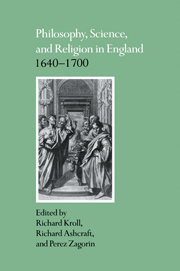Book contents
- Frontmatter
- Contents
- Notes on contributors
- Preface
- 1 Introduction
- Part I The Cambridge Platonists: philosophy at mid century
- Part II The Restoration settlement
- 7 Latitudinarianism and toleration: historical myth versus political history
- 8 The intellectual sources of Robert Boyle's philosophy of nature: Gassendi's voluntarism and Boyle's physico-theological project
- 9 Latitudinarianism and the “ideology” of the early Royal Society: Thomas Sprat's History of the Royal Society (1667) reconsidered
- 10 Locke and the latitude-men: ignorance as a ground of toleration
- 11 John Locke and latitudinarianism
- Index
10 - Locke and the latitude-men: ignorance as a ground of toleration
Published online by Cambridge University Press: 05 November 2011
- Frontmatter
- Contents
- Notes on contributors
- Preface
- 1 Introduction
- Part I The Cambridge Platonists: philosophy at mid century
- Part II The Restoration settlement
- 7 Latitudinarianism and toleration: historical myth versus political history
- 8 The intellectual sources of Robert Boyle's philosophy of nature: Gassendi's voluntarism and Boyle's physico-theological project
- 9 Latitudinarianism and the “ideology” of the early Royal Society: Thomas Sprat's History of the Royal Society (1667) reconsidered
- 10 Locke and the latitude-men: ignorance as a ground of toleration
- 11 John Locke and latitudinarianism
- Index
Summary
Pope's confident line “God said ‘Let Newton be!’ And all was light,” whilst no doubt reflecting the eighteenth-century English view of Newton's achievement, masks the far from certain intellectual steps that preceded and surrounded the birth of the Principia. That Newton's great work was seen as so illuminating, even though it was almost unintelligible to most of the educated public, perhaps suggests the degree of darkness which had so recently prevailed. Indeed, Pope had indicated as much in the first line of his intended epitaph for Newton, the couplet reading as follows:
Nature and Nature's Laws lay hid in Night.
God said, Let Newton be and All was Light.
The seventeenth century was not uniformly an age of intellectual confidence, despite its unprecedented intellectual achievements. Indeed the latter were often a source for the anxieties and uncertainties so characteristic of the age. Other obvious and powerful factors were the numerous religious conflicts, the implications of the new natural philosophy, and the plethora of speculative philosophies, new and old, which were canvassed in the century.
In England political disagreement, fired by religious and other differences, combined with these other forces to provide an environment from which emerged arguments for individual liberty and toleration which were to become incorporated into the political and legal framework of the liberal state.
In this chapter I wish to explore aspects of the development in the second half of the seventeenth century of just one of the arguments for toleration – though I suspect that it is a very important one.
- Type
- Chapter
- Information
- Philosophy, Science, and Religion in England 1640–1700 , pp. 230 - 252Publisher: Cambridge University PressPrint publication year: 1992
- 9
- Cited by

